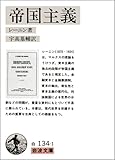Robert Skidelsky “Creative destruction: our economic crisis was wholly predictable” http://www.newstatesman.com/politics/politics/2013/05/creative-destruction-our-economic-crisis-was-wholly-predictable
シュンペーター的なタイトルだが、資本主義の危機に対する3人の経済学者――マルクス、ホブソン、ケインズ――の説明。「閉鎖経済」篇と(対外貿易を考慮した)「開放経済」篇。
曰く、
また〈帝国主義〉論(ホブソン/レーニン)の今日的レリヴァンス;
Keynes explained that it was uncertainty that causes economies to crash. Hobson explained how unequal income distribution makes crises more likely and recoveries more difficult. Marx explained that this inequality is inherent in the power structure of the capitalist system. All have their part to play in explaining the crisis and collapse of 2008.
「グローバル化」を巡って;
The intuitions of Hobson and Lenin also speak to our present situation. Hobson’s notion of a structural imbalance between production and consumption, leading to “excess saving” that requires a foreign vent, surely applies to China. Lenin’s idea that the export of capital is required to overcome periodic crises of profitability in the advanced capitalist nations helps explain the “offshoring” of manufacturing (and service) jobs to China and east Asia.
Dani Rodrik*1の「政治的トリレンマ」論;
Globalisation was business’s “open” economy answer to the problem of domestic underconsumption identified by Hobson and the declining rate of profit predicted by Marx. Hobson’s oversaving analysis best explains China’s reliance on export-led growth, but it also sheds light on western countries’ reliance on access to cheap credit to maintain the stagnating purchasing power of what is now called “the squeezed middle class”. Analysis in terms of the declining rate of profit is good at explaining the accelerated transfer of productive capacity to east Asia. And by completing the destruction of the Keynesian state, globalisation has handed our future to finance, which Keynes identified as the most uncertain, least stable element in the economic structure.
ホブソンって、レーニン*2に先立って「帝国主義」という概念を使った人というくらいのイメージしかないのだが、マルクスやケインズと肩を並べるべき存在だったのか。
According to the Harvard economist Dani Rodrik, we face a “political trilemma”: press on with globalisation and restrict democracy to improve economic efficiency, limit globalisation in the name of democracy, or globalise democracy.The first option will be politically intolerable for large democracies of the west and the third is pie in the sky, which leaves the second. It is time to call a halt to the rush towards globalisation and take stock.
At the minimum, there needs to be a global bargain between the US and China and a regional bargain between Germany and its partners in the eurozone on their respective “rules of the road”, which should aim to prevent the continuing current account imbalances. This is the problem that Keynes’s clearing union was designed to overcome but which the Bretton Woods system failed to solve.
Yet Rodrik’s “trilemma” does not dig deep enough. It assumes that globalisation would be best if it could be made to work equitably. But global economic integration, in the absence of domestic policies to maintain full employment, create a broad base for consumption in all countries and reduce hours of work in the rich countries, is bound to be destructive for the reasons Keynes gave in 1936: it forces countries into export-led solutions to domestic problems which deny democratic control and are bound to bring them into conflict. Closed economy problems identified by Keynes, Hobson and Marx must be overcome if the open economy is to work harmoniously.

帝国主義―資本主義の最高の段階としての (岩波文庫 白 134-1)
- 作者: レーニン,宇高基輔
- 出版社/メーカー: 岩波書店
- 発売日: 1956/05/25
- メディア: 文庫
- 購入: 2人 クリック: 18回
- この商品を含むブログ (10件) を見る